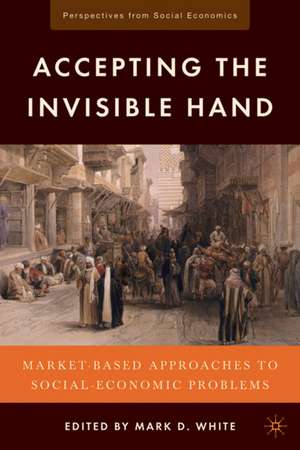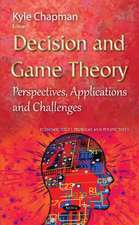Accepting the Invisible Hand: Market-Based Approaches to Social-Economic Problems: Perspectives from Social Economics
Editat de M. Whiteen Limba Engleză Hardback – 26 noi 2010
| Toate formatele și edițiile | Preț | Express |
|---|---|---|
| Paperback (1) | 381.21 lei 6-8 săpt. | |
| Palgrave Macmillan US – 26 noi 2010 | 381.21 lei 6-8 săpt. | |
| Hardback (1) | 384.86 lei 6-8 săpt. | |
| Palgrave Macmillan US – 26 noi 2010 | 384.86 lei 6-8 săpt. |
Preț: 384.86 lei
Nou
Puncte Express: 577
Preț estimativ în valută:
73.65€ • 76.43$ • 61.56£
73.65€ • 76.43$ • 61.56£
Carte tipărită la comandă
Livrare economică 17-31 martie
Preluare comenzi: 021 569.72.76
Specificații
ISBN-13: 9780230102491
ISBN-10: 0230102492
Pagini: 197
Ilustrații: XVI, 197 p.
Dimensiuni: 140 x 216 x 20 mm
Greutate: 0.34 kg
Ediția:2010
Editura: Palgrave Macmillan US
Colecția Palgrave Macmillan
Seria Perspectives from Social Economics
Locul publicării:New York, United States
ISBN-10: 0230102492
Pagini: 197
Ilustrații: XVI, 197 p.
Dimensiuni: 140 x 216 x 20 mm
Greutate: 0.34 kg
Ediția:2010
Editura: Palgrave Macmillan US
Colecția Palgrave Macmillan
Seria Perspectives from Social Economics
Locul publicării:New York, United States
Cuprins
Markets and Dignity: The Essential Link; M.D.White Asserting the Morality of the Market: A Stoic Perspective; J.A.Baker Life in the Market Is Good for You; D.N.McCloskey Philanthropy and the Invisible Hand: Hayek, Boulding, and Beyond; R.Garnett Ethics in the Mayan Marketplace; B.Blevins, G.Ramirez & J.Wight Doing the Right Things: The Private Sector Response to Hurricane Katrina as a Case Study in the Bourgeois Virtues; S.Horwitz Markets, Discovery, and Social Problems: From Political Elitism to Economic Empowerment; J.Meadowcroft Economic Freedom and Global Poverty; J.Gwartney & J.Connors
Recenzii
"Eight papers focus on positive arguments for markets and highlight the important contributions that markets can make to topics within social economics." - Journal of Economic Literature
"Recent global economic turbulence has brought to the forefront discussions not only of competing systems of political economy but of their relative moral status as well. But many of these discussions are either weak on economics or weak on philosophy. Mark D. White's collection of essays is refreshingly strong on both. Its distinguished contributors have written essays that are insightful, engaging, and learned. And they could not be more timely. Together they present a compelling case for reconsidering, and taking seriously, the role that markets and Adam Smith's "invisible hand" play not only in generating material prosperity but in developing a proper moral community. This book should become a mainstay in the classroom, and everyone genuinelyinterested in human flourishing should read it." James R. Otteson, Joint Professor of Philosophy and Economics, Yeshiva University
"Gary Becker once noted that it's hard to appreciate markets. Accepting the Invisible Hand makes it easier. Mark White and his contributors have done an admirable job documenting the social benefits of free markets." Peter T. Leeson, BB&T Professor for the Study of Capitalism, George Mason University
"Our cognitive biases tend to make us suspicious of markets. We often prefer the hidden hand explanation of the conspiracy buff to the invisible hand account of the economist. We think that if there is more for one person, there must be less for others and we are constantly told that only greedy people like markets. This wide-ranging and refreshing volume is a cure for these aliments and errors. Mark White and his excellent and diverse contributors justify, explain, and apply market processes and the bourgeois virtues to a wide range of phenomena, from philanthropy and the fight against poverty to rebuilding New Orleans. If you suffer from marketphobia this book is prescribed if you don't, it's just a treat." Gerald Gaus, James E. Rogers Professor of Philosophy, University of Arizona
'Accepting the Invisible Hand offers a timely defense of this system, given the fact that the severe recession of 2007-09, reminiscent of the Great Depression of the 1930s, has aroused strong sentiments against the market system Readers will encounter philosophical discussion as well as theoretical and empirical analysis. While the operation of the market serves as the unifying theme, the analysis in the book covers a number of areas including health care, global poverty, moral defense of the market and philanthropy.' - CHOICE
"Recent global economic turbulence has brought to the forefront discussions not only of competing systems of political economy but of their relative moral status as well. But many of these discussions are either weak on economics or weak on philosophy. Mark D. White's collection of essays is refreshingly strong on both. Its distinguished contributors have written essays that are insightful, engaging, and learned. And they could not be more timely. Together they present a compelling case for reconsidering, and taking seriously, the role that markets and Adam Smith's "invisible hand" play not only in generating material prosperity but in developing a proper moral community. This book should become a mainstay in the classroom, and everyone genuinelyinterested in human flourishing should read it." James R. Otteson, Joint Professor of Philosophy and Economics, Yeshiva University
"Gary Becker once noted that it's hard to appreciate markets. Accepting the Invisible Hand makes it easier. Mark White and his contributors have done an admirable job documenting the social benefits of free markets." Peter T. Leeson, BB&T Professor for the Study of Capitalism, George Mason University
"Our cognitive biases tend to make us suspicious of markets. We often prefer the hidden hand explanation of the conspiracy buff to the invisible hand account of the economist. We think that if there is more for one person, there must be less for others and we are constantly told that only greedy people like markets. This wide-ranging and refreshing volume is a cure for these aliments and errors. Mark White and his excellent and diverse contributors justify, explain, and apply market processes and the bourgeois virtues to a wide range of phenomena, from philanthropy and the fight against poverty to rebuilding New Orleans. If you suffer from marketphobia this book is prescribed if you don't, it's just a treat." Gerald Gaus, James E. Rogers Professor of Philosophy, University of Arizona
'Accepting the Invisible Hand offers a timely defense of this system, given the fact that the severe recession of 2007-09, reminiscent of the Great Depression of the 1930s, has aroused strong sentiments against the market system Readers will encounter philosophical discussion as well as theoretical and empirical analysis. While the operation of the market serves as the unifying theme, the analysis in the book covers a number of areas including health care, global poverty, moral defense of the market and philanthropy.' - CHOICE
Notă biografică
Mark D. White is Chair of the Department of Philosophy at the College of Staten Island, City University of New York, USA, where he teaches courses in philosophy, economics, and law. He is the author of four books, including The Illusion of Well-Being (2014) and The Manipulation of Choice (2013), plus over forty journal articles and book chapters in the intersections between his three fields. He has also edited or co-edited a number of books, including Retributivism (2011), The Thief of Time (with Chrisoula Andreou, 2010), and Theoretical Foundations of Law and Economics (2009), and he is the editor of the Perspectives from Social Economics series at Palgrave Macmillan.























